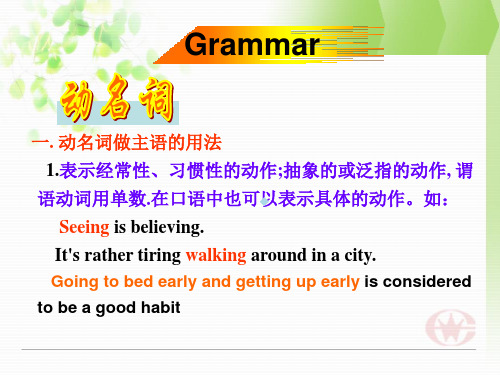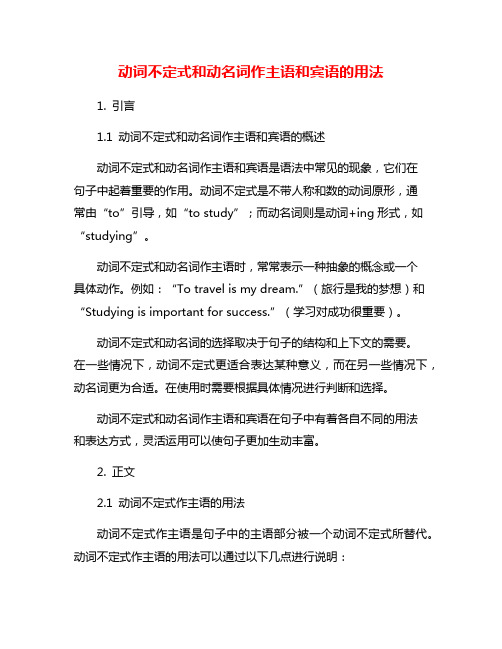动名词作主语和宾语
动名词作宾语主语

I like to read that book.我想看那本书。
They prefer walking to cycling.他们情愿 走路不愿骑车
They prefer to stay at home today.今天他 们情愿呆在家里。
动词-ing形式在句中作主语或宾语,该动词 起名词作用,我们称之为动名词。
1.作主语 Walking is good exercise. 走路是很好的运动。
Seeing is believing.眼见为实。 注意:动名词作主语还常用于“It is no use /good/harm/useless doing sth.”句型中。 It is no use waiting here. 在这儿等是没用的。
Playing with fire is dangerous. (泛指玩火)
To play with fire will be dangerous.(指一具体动作)
2)动名词和不定式作宾语
①在某些动词如like, love, prefer, hate等 后.动名词作宾语表示一般倾向;不定式 作宾语表示特定的或具体的某次行动。如:
(It为形式主语,waiting here为真正的主语)
2.作宾语
My brother likes swimming.我弟弟喜欢 游泳。(swimming为动词like的宾语)
Her sister is good at dancing.她妹妹擅长 跳舞。(dancing为介词at的宾语)
This film is well worth seeing.这部电影值 得看。(seeing为形容词worth的宾语)
动名词作主语和宾语

【考例】
1. I can't imagine __________ that with them.
A. do
B. to do
C. being done D. doing
2. She looks forward every spring to __________ the flower-lined garden.(1995 上海高考题)
• 归纳:常用-ing形式作主语的句型有: • It +be +a waste of time doing • 做……是浪费时间的 • It is/was no good/use doing • 做……是没益/用处的 • It is/was hardly/scarcely worth doing • 做……不值得 • It is/was worth/worthwhile doing • 做……是值得的 • There is no doing • 无法…… , 不允许……
13. You must pay attention to ___ the
works of Lu Xun.
A. read
B. reading
C. reader D. be read
14. You should work tonight instead of
_____ TV.
A. to watch B. you watching
A. study
B. be studied
C. studying
D. have studied
12. We are both looking forward to __ next week. A. going on vocation(休假) B. go on vocation C. be going on vocation D. have gone on vocation
动词不定式和动名词作主语和宾语的用法

动词不定式和动名词作主语和宾语的用法1. 引言1.1 动词不定式和动名词作主语和宾语的概述动词不定式和动名词作主语和宾语是语法中常见的现象,它们在句子中起着重要的作用。
动词不定式是不带人称和数的动词原形,通常由“to”引导,如“to study”;而动名词则是动词+ing形式,如“studying”。
动词不定式和动名词作主语时,常常表示一种抽象的概念或一个具体动作。
例如:“To travel is my dream.”(旅行是我的梦想)和“Studying is important for success.”(学习对成功很重要)。
动词不定式和动名词的选择取决于句子的结构和上下文的需要。
在一些情况下,动词不定式更适合表达某种意义,而在另一些情况下,动名词更为合适。
在使用时需要根据具体情况进行判断和选择。
动词不定式和动名词作主语和宾语在句子中有着各自不同的用法和表达方式,灵活运用可以使句子更加生动丰富。
2. 正文2.1 动词不定式作主语的用法动词不定式作主语是句子中的主语部分被一个动词不定式所替代。
动词不定式作主语的用法可以通过以下几点进行说明:1. 表示一种行为或动作的意图或目的。
例如:"学习是成功的关键。
"2. 表示一种抽象的概念或观念。
例如:"帮助他人是一种美德。
"3. 在句子中作为主语时,通常放在句首位置。
例如:"抽烟会影响健康。
"4. 动词不定式作主语时,动词不定式通常是不带to的形式。
例如:"去旅行是我的梦想。
"5. 在某些情况下,动词不定式作主语时可以使用to的形式。
例如:"To learn a new language is challenging."动词不定式作主语可以使句子更加简洁明了,同时也可以突出所表达的意思或观点。
在写作中,我们可以适当运用动词不定式作主语来丰富句子结构,提高文章的表达力和逻辑性。
动名词作主语和宾语(57张PPT)

need,demand,want,require在表 示“需要”时,用v.ing的主动形式表被 动,或用不定式的被动形式。
repairing. The car needs
to be repaired. 这辆汽车需要修理。 The sick woman required taking good care of / to be taken good care of. 这位生病的妇女需要很好地照顾。
1) 做出努力是值得的。
It’s worth making the effort.
2) 和夏洛克争辩是没有什么用的。
___It_i_s_u_s_e_l_e_s_s_t_r_y_in_g__to__a_r_g_u_e____ with Shylock.
3) 跟你在一起工作是令人愉快的。 _____It_i_s_a__p_le_a_s_u_r_e_w__o_rk_i_n_g__w_i_th__y_o_u_._______ 4)玩电子游戏是浪费时间。 It's a waste of time p_l_a_y_in_g__c_o_m__p_u_te_r__g_a_m_e_s. .
1. Since then, finding ways to grow more rice
has been his life goal.
subject
2. He enjoys listening to violin music, playing
mah-jong, swimming and reading. object
country.
动名词直接置于句首主语的位置上。
1) 捉弄别人是我们万万不能干的. __P_l_a_y_in_g__t_ri_c_k_s_o_n__o_t_h_e_rs_ is something we
动名词作宾语、主语

8.——You were brave enough to raise objections at the meeting.
——Well, now I regret _______that.
A.to do
B.to be doing
C.to have done D.having done
9.She didn’t remember _______him before.
5.One learns a language by making mistakes
and _______them.
A.correct
B.correcting
C.correct D.to correct
6.Mr. Reed made up his mind to devote all he
had to _______some schools for poor children.
3. I really appreciate _______to relax with you on this nice island. A.to have had time B.having time C.to have time D.to having time
4.Fishing is his favorite hobby, and_______. A.he’s like to collect coins as well B.he feels like collecting coins,too C.to collect coins is also his hobby D.collecting coins also gives him great pleasure
D. Mary’s being married Jim
动名词作主语、宾语和表语_句子成分 英语语法.doc

动名词作主语、宾语和表语_句子成分1)作主语Fighting broke out between the South and the North.南方与北方开战了。
2)作宾语a. 动词后加动名词doing作宾语V. + doing sthadmit 承认appreciate 感激,赞赏avoid 避免complete 完成consider 认为delay 耽误deny 否认detest 讨厌endure 忍受enjoy 喜欢escape 逃脱prevent阻止fancy 想象finish 完成imagine 想象mind 介意miss 想念postpone 推迟practise 训练recall 回忆resent 讨厌resist 抵抗resume 继续risk 冒险suggest 建议face 面对include 包括stand 忍受understand 理解forgive 宽恕keep 继续举例:(1)Would you mind turning down your radio a little, please?(2)The squirrel was lucky that it just missed being caught.b. 词组后接doingadmit to preferto be used to lead to devote oneself to object to stick to be busylook forward to to为介词)no good,no use,It’s worth,as well as,can’t help,It’s no use /good be tired ofbe fond of be capable of be afraid ofbe proud of think of / about hold offput off keep on insist on count on / uponset about be successful in good at take upgive up burst out prevent from3)作表语Her job is washing,cleaning and taking care of the children.。
从高考题谈动名词作主语和宾语
从高考题谈动名词作主语和宾语1.动名词作主语例:1.-What do you think made Mary so upset?-___ her new bicycle.(1997上海)A. As she lost B.LostC.Losing D.Because of losing解析:答案C。
Losing在此为动名词,与her new bicycle构成动名词短语在句中作主语。
该题可以理解为:Losing hernew bicycle made Mary so upset.1.在下面的句型中,it是形式主语,v-ing形式作真正的主语。
1) It’s no use/good+v-ing.如:It’s no good smoking, you’d better give it up.It’s no use arguing with him.2)It’s a waste of time / so nice/ foolish interesting / doing sth.It’s a waste of time waiting here.在这里等是浪费时间。
It‘s so nice talking to you.很高兴和你谈话。
2.v-ing形式作主语,谓语动词用单数。
Learning new words is very useful to me.Writing headlines in English is not an easy job.动名词作宾语1)有些动词后只接动名词作宾语。
这类动词常见的有:admit,advise,finish, avoid,escape, delay,consider,dislike, mind, suggest,enjoy,miss ,practise,imagine,appreciate(感激),risk(冒险)等等。
2.Our monitor suggested _____a discussion of this subject. (85’)A.to have B.should haveC.have D.HavingKey: D2)有些动词和动词词组既可接不定式也可接动名词作宾语,但意思不同。
动名词作主语和宾语
05 动名词作主语和宾语的练 习与巩固
单项选择题
总结词
考察动名词作主语和宾语的辨析能力
详细描述
提供一系列单项选择题,要求选择正确的动名词短语作为主语或宾语,以检验学生对动名词作主语和宾语的掌握 程度。
填空题
总结词
考察动名词作主语和宾语的运用能力
要点二
语义重点
动名词在作主语时,强调的是整个动 作或行为本身;而在作宾语时,强调 的是动作或行为的对象或结果。
要点三
使用频率
在实际语言使用中,动名词作主语的频 率相对较高,尤其是在一些固定表达和 习惯用法中,如“Smoking is harmful to health.(吸烟有害健 康。)”中的“Smoking”就是主语。 而宾语则相对较少使用动名词,更多地 使用其他类型的宾语,如名词、代词等。
详细描述
给出句子,要求填写合适的动名词短语作为主语或宾语,以检验学生能否在实际语境中 正确运用动名词作主语和宾语。
翻译题
总结词
考察动名词作主语和宾语的翻译技巧
详细描述
提供一段英文句子,要求将其中的动名词短 语翻译成中文,并保持原意不变,以检验学 生对动名词作主语和宾语的翻译能力。
THANKS FOR WATCHING
习惯用法
习惯用法是指某些动词在特定语境下 习惯性地使用动名词形式。例如, “He recommended me buying a new car”中,“buying a new car”是习惯用法,表示“他建议我 买一辆新车”。
VS
习惯用法通常与特定的动词或短语相 关,反映了语言使用者的习惯和约定 俗成的表达方式。
动名词作主语、宾语和表语
外教一对一动名词作主语、宾语和表语1)作主语Fighting broke out between the South and the North.南方与北方开战了。
2)作宾语a. 动词后加动名词doing作宾语 V. + doing sthadmit 承认 appreciate 感激,赞赏 avoid 避免complete 完成 consider 认为 delay 耽误 deny 否认 detest 讨厌 endure 忍受enjoy 喜欢 escape 逃脱 prevent阻止fancy 想象 finish 完成 imagine 想象 mind 介意 miss 想念 postpone 推迟practise 训练 recall 回忆 resent 讨厌 resist 抵抗 resume 继续 risk 冒险suggest 建议 face 面对 include 包括 stand 忍受 understand 理解 forgive 宽恕keep 继续举例:Would you mind turning down your radio a little, please?The squirrel was lucky that it just missed being caught.b. 词组后接doingadmit to prefer…to be used to lead to devote oneself to object to stick tobe busy look forward to to为介词)no good, no use, Its worth…, as well as,cant help, Its no use /good be tired ofbe fond of be capable of be afraid of外教一对一 be proud of think of / about hold offput off keep on insist on count on / uponset about be successful in good at take upgive up burst out prevent … from…3)作表语Her job is washing,cleaning and taking care of the children.。
动名词做主语和宾语
功能及用法(作主语)
③在there be结构中作主语,这种结构的意思相当 于“It is impossible to do… ” 如
There is no doing……: 1)这种事开不得玩笑。
Here is __n_o__j_o_k_i_n_g__ about such matter.
2)无法知道他什么时候离开。
(一).(1)只能后接动名词作宾语的动词,常见的有avoid, consider,enjoy,keep,finish,suggest,dislike,delay, escape,imagine,mind,miss,practise,cannot stand等。 如:
1)我不能不去。 I can’t avoid_g_o_i_n_g_._
不及物动词
形式
主动 被 动 主 动
一般式 doing
being done doing
完成式 having done
having been having
done
done
功能及用法(作主语)
1.作主语. 动名词作主语时,句子有三种形式: ①动名词直接置于句首主语的位置上。
②用形式主语it,把真正的主语——动名词结构移置句尾。 但这种句子形式有一定的限制,作表语的只能是某些形容词或少数 名词, 如useful,useless,good,fun;no use,a waste of等。如:
具体的或一次性的动作
__S_w_i_m_m__in__g___(swim)is good for our health. ___T_o_s_w__im______(swim)in this river is not allowed
功能及用法 (用作宾语)
- 1、下载文档前请自行甄别文档内容的完整性,平台不提供额外的编辑、内容补充、找答案等附加服务。
- 2、"仅部分预览"的文档,不可在线预览部分如存在完整性等问题,可反馈申请退款(可完整预览的文档不适用该条件!)。
- 3、如文档侵犯您的权益,请联系客服反馈,我们会尽快为您处理(人工客服工作时间:9:00-18:30)。
动名词作主语和宾语
1.
注意:动名词的否定形式直接在它之前加not。
2.Detailed principles
①动名词做主语的用法(subject)
动名词做主语往往表示经常性、习惯性的动作,谓语动词用单数动词。
如:
__________(see) is believing. ____________(help) her is my duty.
__________ (eat)too much is bad for your health.
______________(work)with you is a pleasure.
动名词做主语和不定式做主语一样,也可以用it作形式主语。
如:
●It is useless trying to argue with Mark.
●It is no use talking with him.
归纳:常用-ing形式作主语的句型有:
●It be no use/useless doing 做……是没用的
●_____________________________________________
●_____________________________________________
●_____________________________________________
●……
eg:在这儿等没好处,我们走回家吧。
争辩此事是浪费时间。
要把一切按时准备好很困难。
②动名词作宾语的用法(object)
1.有些动词或短语后常用动名词作宾语。
如admit, appreciate, avoid, consider, suggest, allow, enjoy, escape, finish, imagine, practise, mind, miss, imagine等动词, insist on, keep on, give up, feel like, dream of, be/get used to, look forward to, devote…to, pay attention to等短语。
eg:你介意把门打开吗?(mind)
工作之余,袁隆平喜欢听小提琴曲。
(enjoy)
那个姑娘每晚练习拉小提琴。
(practise)
这些天他在考虑换工作。
(consider)
他承认犯了一个严重错误。
(admit)
今晚我想去看电影。
(feel like)
人们不断来医院看望他。
(keep on)
2.在allow, advise, permit等动词后直接跟动名词作宾语,如果这些词后有名词或代词作宾语,则构成“allow/advise/permit +名词/代词+不定式(宾语补足语)”之形式。
如:
We don't allow smoking here.
We don't allow anybody to smoke here.
3.有些动词和动词短语用it作形式宾语,而把真正的宾语——动名词放在后面。
常用的结构有:主语+ think/consider/find/…+ it useless/no use/no good/worthwhile/…+doing
e g: 我发现争论这件事没有用。
我认为不值得到这样一个地方去。
4.动词need, require, want意为“需要”时,后跟动名词的主动式或不定式的被动式作宾语,意义一样。
即need/require/want + doing = need/require/want + to be done. 如:Your shirt needs washing.
Your shirt needs to be washed.
这辆旧车需要修。
5.有些动词后跟动名词和跟不定式区别较大。
如:forget, go on, mean, remember, regret, stop, try, be used to, can't help等。
go on doing ________________ go on to do _________________
mean doing _________________ mean to do __________________
stop doing _________________ stop to do ____________
try doing____________________ try to do_________________
be used to doing______________ be used to do_________________
can't help doing ________________can't help to do____________________
regret doing_____________ regret to do___________________
eg: 我记得我已把信寄了。
我会记着去寄信的。
我永远不会忘记见到过那位著名作家。
不要忘了给你母亲写信。
我真后悔没赶上那次报告会。
我遗憾地告诉你我不能接受你的建议。
